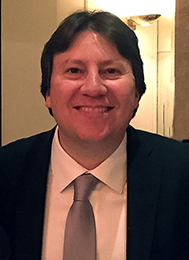Ariel Libhaber
On his Jewish journey, doing it all and keeping it real
 My work is aligned “with my life journey and Jewish journey. World Jewry is in my DNA,” says Ariel Libhaber, MA/MBA’08. Born in Argentina, raised and educated there and in Israel and South Africa, Ariel emigrated to the United States in 2005. He settled in Boston, attracted by its multiculturalism, old-world charm and world-class institutions.
My work is aligned “with my life journey and Jewish journey. World Jewry is in my DNA,” says Ariel Libhaber, MA/MBA’08. Born in Argentina, raised and educated there and in Israel and South Africa, Ariel emigrated to the United States in 2005. He settled in Boston, attracted by its multiculturalism, old-world charm and world-class institutions.
Trained as a sociologist, he found work at the Steinhardt Social Research Institute at Brandeis University where he learned about and was invited to join the Hornstein Program.
This was a turning point for Ariel. Equipped with an expanding and “empowering set of tools and insight” into the Jewish world of nonprofits, he did his fieldwork at Combined Jewish Philanthropies of Greater Boston (CJP) where he began testing and applying his new knowledge. His focus was on a strategic plan for their Israel and Overseas programs and Boston-Haifa Connection. After he graduated, CJP hired him to keep working on the project.
Today Ariel is director of CJP’s Boston-Haifa Connection. “The exciting thing with the work at Boston-Haifa is that I was able to be a part of it from planning to implementation, oversight and growth,” says Ariel. He’s seen projects from brainstorming stages through implementation to meeting the people for whom the projects were designed to serve. “It's very rewarding and I'm lucky to have been a part of it and to see it continue to thrive and grow.”
“We are in the people business,” says Ariel. “At the core of what we do is a deep commitment to each other and the Jewish People. We truly care about our future and know that we are stronger together than apart.”
In His Own Words: An Interview with Ariel Libhaber
This interview with Ariel was published in the Hornstein Program's Impact Newsletter, March 2016. If you would like to quote any part of this conversation, please attribute content to the Hornstein Jewish Professional Leadership Program at Brandeis University and link to this page. All rights reserved.
“We are knee-deep in each other's lives, for better or worse... This is all based on the notion of Jewish Peoplehood, that we should be part of and play a role in each other's lives and do some good for this world.”
Ariel Libhaber, MA/MBA’08